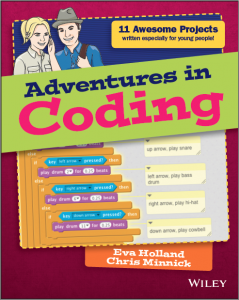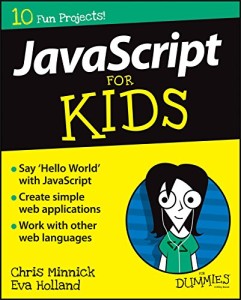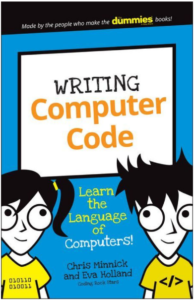 Since we’ve started writing books for kids, we’ve seen and heard from hundreds of our readers that they “love” our books, or that they’re having “fun” with our books. These aren’t words that you typically hear adults say about computer programming how-to books. But, why not?
Since we’ve started writing books for kids, we’ve seen and heard from hundreds of our readers that they “love” our books, or that they’re having “fun” with our books. These aren’t words that you typically hear adults say about computer programming how-to books. But, why not?
It may have something to do with the style in which books for adults are typically written or in which courses for adults are typically taught (not ours!). Writers and publishers assume that adults want to get to the facts, want dense content, and are goal-oriented. They need to know this topic, and they need it as fast as possible.
This approach leads to the vast majority of technical books being abandoned by all but the most determined readers after the first 2 chapters. The reader may blame themselves for the failure, as we saw in a recent review of one of the books Chris co-authored prior to WatzThis?:
“It might be good, I can’t say. The blocks of text are too ‘thick’ for me to read. Someone who can focus on dry writing might find it more useful.”
The fault isn’t this reader’s inability to read paragraphs. The fault is clearly with the authors, the publisher, and the computer book publishing industry’s general opinion of what adult readers want.
 Yes, adults have jobs and they need to learn certain skills in order to perform their jobs or advance their careers. “Complete” and “detailed” coverage of the material is generally more highly valued among readers and publishers than keeping it short and entertaining. But, if a person’s first experience with programming leaves them feeling like it’s something that they’ll never be able to do … that they’re “too dumb even for dummies” … a terrible disservice has been done to the reader; and as a teacher, you feel like you’ve failed.
Yes, adults have jobs and they need to learn certain skills in order to perform their jobs or advance their careers. “Complete” and “detailed” coverage of the material is generally more highly valued among readers and publishers than keeping it short and entertaining. But, if a person’s first experience with programming leaves them feeling like it’s something that they’ll never be able to do … that they’re “too dumb even for dummies” … a terrible disservice has been done to the reader; and as a teacher, you feel like you’ve failed.
We believe the solution is in adventure.
For kids, programming is a new experience that opens up cool new worlds to them where they can have the power to create things. They don’t care much about the technical details: they want to make something new. For adults, learning a programming language (or any language, for that matter) is a gateway to new opportunities, and hopefully adventures, of a better job or starting a business or pursuing a dream through creating an app or a website.
Many kids’ books do a good job of incorporating stories and a sense of wonder into the teaching of the material. Books for adult beginners should do the same, and adult beginners should seek out these books rather than looking for the thickest, newest, or most complete book on a topic.
 In the meantime, we recommend that adults who have an interest in learning to program for the first time skip the adult books on the subject. Pick up a programming for kids book and have fun with it.
In the meantime, we recommend that adults who have an interest in learning to program for the first time skip the adult books on the subject. Pick up a programming for kids book and have fun with it.
